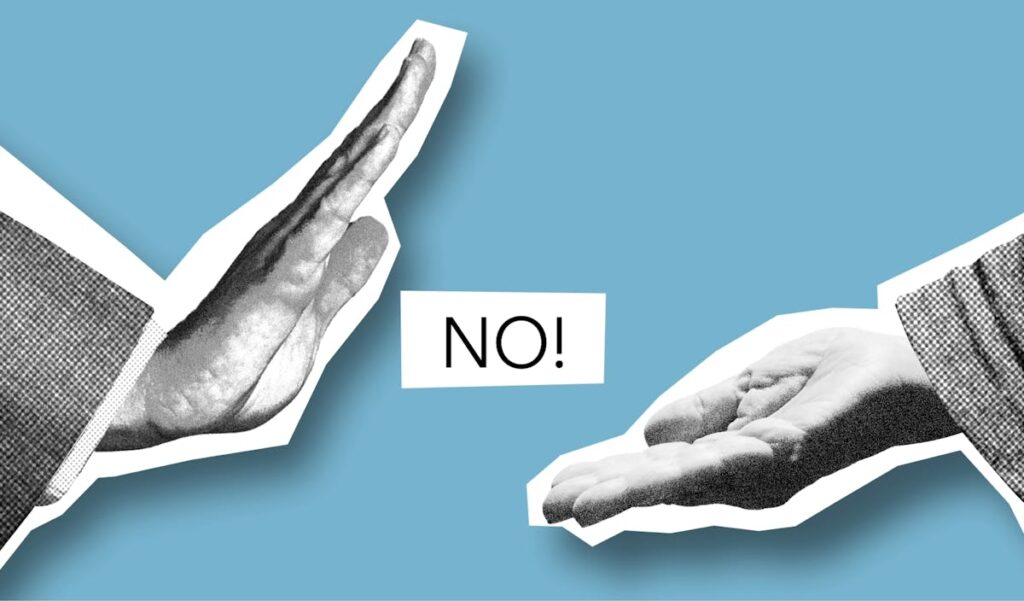How many times have you said “yes” when you really wanted to say “no”? Whether it’s taking on extra work, attending a social event you’re not excited about, or helping someone at the expense of your own well-being, saying “yes” too often can leave you feeling drained, stressed, and overwhelmed. But here’s the truth: saying “no” isn’t selfish—it’s essential for protecting your mental health and energy.
Psychologists agree that setting boundaries by saying “no” is one of the most powerful ways to prioritize your well-being. Let’s explore why saying “no” is so important and how it can transform your life.
The Power of Saying No

Saying “no” is more than just a word—it’s a boundary. It’s a way of protecting your time, energy, and mental health. When you say “no,” you’re making a conscious choice to prioritize yourself and your needs. This might feel uncomfortable at first, especially if you’re used to putting others first, but the benefits are worth it.
Saying no can be a transformative act of self-care. To understand how it impacts your overall well-being, explore Why Saying ‘No’ More Often Can Transform Your Life
According to psychologists, saying “no” is a form of self-care. It allows you to focus on what truly matters to you, reduces stress, and prevents burnout. In a world that often glorifies busyness and people-pleasing, learning to say “no” is a radical act of self-preservation.
The Psychological Benefits of Saying No

Research shows that setting boundaries by saying “no” can have profound effects on your mental health and overall well-being. Here’s what the science says:
- Reduces Stress and Anxiety: A study published in the Journal of Personality and Social Psychology found that people who struggle to say “no” are more likely to experience stress, anxiety, and burnout. Setting clear boundaries helps you manage your workload and avoid overcommitting.
- Improves Self-Esteem: Saying “no” reinforces your sense of self-worth. It sends a message to yourself and others that your time and energy are valuable. According to psychologist Susan David, author of Emotional Agility, setting boundaries is a key component of emotional health.
- Boosts Productivity: When you say “no” to distractions and unnecessary commitments, you free up time and energy to focus on your priorities. Research from the University of California, Irvine shows that multitasking and overcommitting can reduce productivity by up to 40%.
- Enhances Relationships: Contrary to popular belief, saying “no” can actually improve your relationships. It fosters honesty and mutual respect, allowing you to show up as your best self in your interactions with others. A study in the Journal of Social and Personal Relationships found that people who set boundaries report higher levels of relationship satisfaction.
Why Saying No Is So Hard

Despite the benefits, many people struggle to say “no.” Here are some common reasons why:
- Fear of Disappointing Others: Many of us worry that saying “no” will let others down or make us seem unkind. However, saying “yes” when you don’t have the capacity often leads to resentment and exhaustion.
- Desire to Be Liked: We often say “yes” to gain approval or avoid conflict. But constantly seeking external validation can erode your self-esteem and leave you feeling depleted.
- Guilt: Some people feel guilty for prioritizing their own needs. However, as psychologist Brené Brown explains, “Choosing to set boundaries is choosing to love yourself.”
- Fear of Missing Out (FOMO): The fear of missing out can make it hard to say “no” to social events or opportunities. But overcommitting can leave you too exhausted to enjoy the things that truly matter to you.
Overcommitting often leads to stress and poor decisions. Learn strategies to overcome overwhelm in How to Make Smart Decisions When You’re Overwhelme
How Saying No Protects Your Mental Health and Energy

1. Prevents Burnout
Saying “no” helps you avoid taking on more than you can handle. Burnout occurs when you’re constantly overextended, leading to physical, emotional, and mental exhaustion. By setting boundaries, you protect yourself from burnout and maintain a healthier balance.
2. Creates Space for What Matters
When you say “no” to things that don’t align with your priorities, you create space for the things that do. Whether it’s spending time with loved ones, pursuing a passion, or simply resting, saying “no” allows you to focus on what brings you joy and fulfillment.
3. Reduces Resentment
Saying “yes” when you want to say “no” often leads to resentment—toward yourself and others. By setting boundaries, you can avoid these negative emotions and foster healthier, more authentic relationships.
4. Increases Self-Awareness
Saying “no” requires you to tune into your own needs and desires. This self-awareness is essential for making decisions that align with your values and goals.
Simplify your mental load by saying no to unnecessary obligations. Find out how decluttering your mind leads to happiness in Mental Minimalism: Declutter Your Thoughts for a Happier You
How to Say No Gracefully

Saying “no” doesn’t have to be harsh or confrontational. Here are some tips for setting boundaries with kindness and confidence:
- Be Honest but Tactful: You don’t need to over-explain or make excuses. A simple “I’m not able to take this on right now” is enough.
- Offer an Alternative: If you want to help but can’t commit fully, suggest an alternative. For example, “I can’t attend the meeting, but I’d be happy to review the notes afterward.”
- Practice Self-Compassion: Remind yourself that it’s okay to prioritize your needs. Saying “no” is an act of self-respect, not selfishness.
- Use “I” Statements: Frame your response in terms of your own limitations. For example, “I need to focus on my own priorities right now” is more effective than “You’re asking too much of me.”
- Start Small: If saying “no” feels daunting, start with low-stakes situations and work your way up. The more you practice, the easier it will become.
Real-Life Examples of the Power of Saying No
1. Oprah Winfrey
Oprah has spoken openly about the importance of saying “no” to protect her energy and focus. By setting boundaries, she’s been able to build a successful career while maintaining her well-being.
Saying no helps you focus on opportunities that truly matter. Learn how to shift your perspective in How to Train Your Mind to See Opportunity in Every Problem
2. Warren Buffett
The billionaire investor once said, “The difference between successful people and really successful people is that really successful people say no to almost everything.” By saying “no” to distractions, Buffett has been able to focus on what truly matters.
3. Shonda Rhimes
The creator of Grey’s Anatomy and Scandal has credited her success to learning to say “no.” In her book Year of Yes, she explains how setting boundaries allowed her to reclaim her time and energy.
The Long-Term Benefits of Saying No

Learning to say “no” is a skill that pays off in the long run. Here are some of the lasting benefits:
- Improved Mental Health: Setting boundaries reduces stress and prevents burnout.
- Greater Focus and Productivity: Saying “no” frees up time and energy for your priorities.
- Stronger Relationships: Honest communication fosters trust and mutual respect.
- Increased Self-Confidence: Saying “no” reinforces your sense of self-worth.
Setbacks are opportunities to realign priorities and say no to distractions. Discover the power of resilience in Turning Setbacks Into Stories: The Power of Narrative Thinking
Final Thoughts: Saying No Is Saying Yes to Yourself
Saying “no” isn’t about being negative or unkind—it’s about protecting your mental health and energy. By setting boundaries, you create space for the things that truly matter to you. As psychologist Adam Grant puts it, “Saying no is a way of saying yes to what’s important.”
So, the next time you’re tempted to say “yes” when you really mean “no,” take a moment to pause. Remember that your time and energy are precious, and it’s okay to prioritize yourself. Saying “no” isn’t just a word—it’s a powerful tool for living a healthier, happier, and more fulfilling life.
References:
- Journal of Personality and Social Psychology – Boundaries and Stress
- Susan David on Emotional Health
- University of California, Irvine – Multitasking and Productivity
- Journal of Social and Personal Relationships – Boundaries and Satisfaction
- Brené Brown on Boundaries
Featured image by Aitoff via Pixabay
